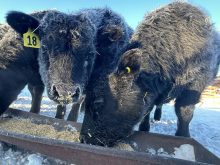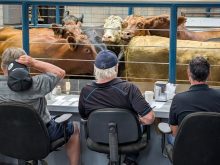Anew national beef-marketing agency could be in place this summer even though one of the main parties involved refuses to endorse it.
Canada’s provincial cat-t le associations are acting unilaterally to form the agency despite the fact that the Canada Beef Export Federation has not ratified it.
A Feb. 17 CBEF special members’ meeting was supposed to approve a merger involving itself, the Beef Information Cent re and the Canadian Beef Cattle Research, Market Development and Promotion Agency.
The merger, recommended by an industry working group, would form Canada Beef, a super-agency to research and promote Canadian-grown beef.
Read Also

Farm trade policy pundits lay CUSMA odds
What’s the future of Canada’s free trade agreement with the U.S. and Mexico? Policy experts try to read the stars on the issue
CONFUSION
But the CBEF meeting in Toronto broke up in confusion after adjourning without voting on a merger resolution.
Provincial cattle groups, who are responsible for nearly all CBEF’s budget, promptly resigned from the agency.
Now the groups and several large packers say a merger to form the new organization will go ahead anyway.
“The merger will go on with or without CBEF,” said Major Jay Fox, Manitoba Beef Producers president.
“It would have been nice to have CBEF on board. But they chose to adjourn the meeting not allowing the vote to happen.”
BIZARRE WEEK
The decision by provincial groups to carry on capped a bizarre week for the beef industry in which the proposed merger appeared to die, only to re-emerge under new direction.
Meanwhile, CBEF, now virtually without funding, may have to close up shop in a few months.
“For all intents and purposes, our entire budget is gone, said Gib Drury, CBEF chair.
This wasn’t quite what the Canada Beef Working Group had in mind when it recommended in a report early last year that CBEF, BIC and the national checkoff agency amalgamate to form a single beef research and marketing organization with a unified voice.
The CBWG report predicted the new body would save $1.3 million a year by consolidating operations.
Provincial cattle associations and other major industry players have long supported a single beef agency instead of three separate ones.
DECISION
But the decision to merge ultimately rested with the three agencies, not the provincial funders.
All three appeared on side at first. CBEF directors approved the merger at a board meeting in January. A special members’ meeting was called to ratify the board decision, dissolve CBEF and turn its assets over to the new group.
But the Feb. 17 meet ing ended in disarray on a motion to adjourn without voting on the merger.
The provincial funders immediately resigned their memberships, as did several high-profile CBEF board members.
CBEF vowed to carry on at its semi-annual meeting immediately following the special members’ meeting. It filled its board vacancies and elected five representatives to continue serving on the CBWG.
BACK ON TRACK
Drury said later the agency would ask the working group to reconvene and try to get the merger back on track.
But a CBWG spokesperson said his group’s work is done and the committee has disbanded.
Co-chair Brian Ross said the working group’s job was to propose a new structure for the beef industry and that’s what it did.
“Our mandate has basically expired,” said Ross, a producer from Estevan, Saskatchewan.
Chuck MacLean, Alberta Beef Producers chair, said the biggest industry players are behind the merger and CBEF is no longer in the picture.
Those involved include cattle producer groups from Alberta and Saskatchewan, which together provide three-quarters of a national funding checkoff on cattle sales, and Cargill and XL Foods, which slaughter the majority of cattle in Canada.
“In effect, what this does is allow the industry and the funders to go ahead and form a new organization to carry forward what the funders have been wanting to do all along,” said MacLean.
He said the new agency could be in place by the end of June if all goes well.
Travis Toews, Canadian Cattlemen’s Association president, said now is a good time for the beef industry to take a new direction. The industry has come through some tough times and a fresh approach is appropriate, he said. [email protected]
———
ThemergerwillgoonwithorwithoutCBEF.”
– JAY FOX, MBP













